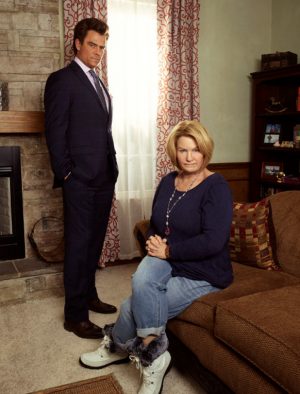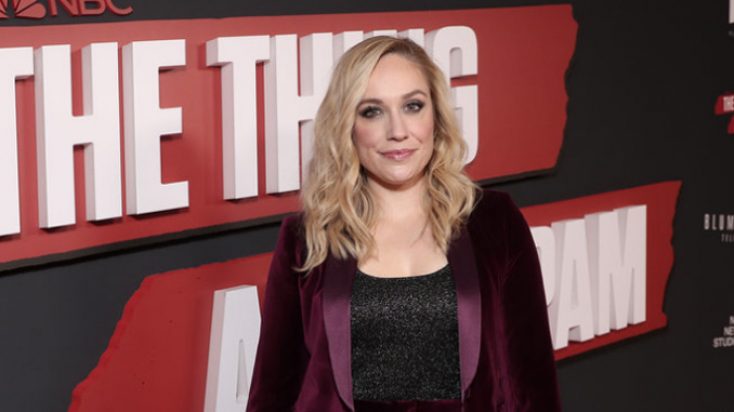
(l-r) Josh Duhamel as Joel Schwartz and Renée Zellweger as Pam Hupp in THE THING ABOUT PAM. ©NBC. CR: Frank Ockenfels/NBC.
By JUDY SLOANE
Front Row Features
HOLLYWOOD—The true crime story of Pam Hupp was investigated on “Dateline NBC,” becoming one of the show’s most popular subjects. It went on to become a successful podcast in 2019, being downloaded more than 20 million times. Now, it’s the subject of an NBC limited TV series, “The Thing About Pam,” starring two-time Academy Award winning actress Renee Zellweger (“Judy,” “Cold Mountain”).
The series spotlights the brutal murder of Betsy Faria in 2011, which resulted in her husband Russ’s conviction, even though he insisted he was innocent. Later exonerated, the focus switched to Betsy’s friend, Pam Hupp (Zellweger,), the last person to see her alive.
Executive producer/showrunner Jenny Klein (“Jessica Jones,” “The Witcher”) and Zellweger joined the TV Critics Association’s virtual tour to discuss the six-episode limited series, which premieres on NBC Tuesday March 8, at 10 p.m.
Q: Jenny, what makes this different from other murder cases?
Jenny Klein: I would say, in large part, it starts with this marriage we have between NBC News Studios, having access to all of the extensive reporting done on this case. It really lends this sense of familiarity when it comes to the “Dateline” aspects infused in the show. And then, there’s just this palpable strangeness. It’s a true-crime story that, in some ways, won’t leave you feeling depressed, but will keep you on the edge of your seat because there’s so many twists and turns.
Q: How did you figure out the tone for the series? It’s like a fun “Desperate Housewives,” which is not something you expect with a true crime story.
Klein: On the one hand, it (can) be one of your biggest challenges, or it can be this defining strength of the show. You have this story that’s so tragic, disturbing and unspeakable. On the other side of the very same coin, you have these absurd details that Pam really did or said. But always at the heart of the show, you have Betsy and her family, and that grounding emotional center with Russ. It’s a real push‑and‑pull between the levity and the drama.
Q: This is a story that’s been told in multiple hours on “Dateline” and on a podcast. What are the challenges of finding your own way into it so it’s not just a scripted version of things people have seen or listened to before?
Klein: Singing the praises of our amazing cast, (they are) bringing these people to life in ways that a podcast, by its nature, simply can’t. On another level, we were able to delve deeper into who Pam is; the mask of normalcy that she presents, [and] explore her history.
I’ve never seen a character like Pam on TV; someone who’s completely unfazed when caught in a lie, and changing her story so much. It almost creates a game for the viewer, where they’re the only ones actually tracking Pam’s lies through her world because they’re the only ones taking in the show as a whole.
Q: Renee, was there something about this particular character, or the writing of the series, that made you want to portray Pam?
Renee Zellweger: Well, Ms. Jenny hadn’t written it yet, so it was thrilling to be part of the process of watching what she was able to create from the materials that are out there, the podcast and the “Dateline” episodes.
This is one of those stories that you couldn’t make up. I binged the podcast when I was driving up and down the 5 Freeway, (taking) my dog to get his hip replaced in San Francisco. I couldn’t believe it. It was just an experience of escalating absurdities. It felt like it would be something really interesting to explore further.
Q: Pam is such a scary, menacing character, and you are so opposite of that; what are some of the things that you did to prepare to play her?
Zellweger: All the interviews, plus what’s on public record from Hands on News, the court appearances, having to look at all these materials, and then, reading some books about human behavior and what might motivate certain choices. I think that the performance is an amalgam of those things.
Q: Can you talk about Pam’s accent?
Zellweger: The accent was elusive. I was listening to accents from the regions that she had grown up in and where she lived, and it was peculiar. It’s very unique to Pam. It’s not necessarily regional. She has a lot of colloquialisms that are uniquely hers. So, I had her voice and my voice notes, and different sentences that would trigger it, and put me in the right cadence.
Q: How do the prosthetics you wear in this factor into your performance?
Zellweger: I think all actors agree that that’s part of your toolkit that makes it easier to achieve what it is that you’re trying to, in terms of telling someone else’s story. The further you are away from yourself, the safer you feel to explore.
Q: Can you talk about the actual process of going through the prosthetics?
Zellweger: With the exception of tiny bits and pieces that I’ve used in performances before, this one was the most comprehensive and involved.
Every day I learned something new, not just about how the pieces are built, [but] how they have minds of their own. What they become during the day isn’t quite what they begin as in the morning. I also learned that it’s a different kind of skill to work with your entire body covered in prosthetics. I didn’t know that that was a skill that I didn’t have.
It took about four hours to start. And Arjen, who is a genius, whittled it down to about two and a half hours. It was entertaining every day. That might make me a crazy person to find that fun, gluing stuff to your head every day, but I did find it fun. (She laughs.)





